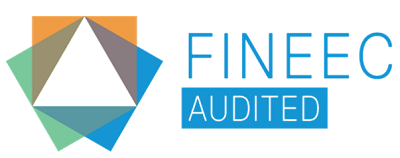Quality management at TAMK
Tampere University of Applied Sciences aim is to produce the best professional higher education and innovations as a multidisciplinary higher education institution. As a working life oriented university of applied sciences, we ensure that our students have the best learning possibilities and we participate in research, development and innovation of regional working life. (TAMK Strategy 2030.) The quality system supports, guides and ensures realisation of the Universities of Applied Sciences Act, TAMK’s vision and objectives as an integrated part of the management system and daily operations.
The key quality management principle is continuous development (Plan, Do, Study, Act). Operation is evaluated and developed based on feedback and follow-up data. Corrective action is taken in a need-based and customer-oriented manner as an integrated part of continuous and annual development of the higher education institution. The quality system enables knowledge-based management. The quality system includes procedures, processes and systems which TAMK uses to maintain and develop the quality of its operation. The quality system covers operations of the whole TAMK.
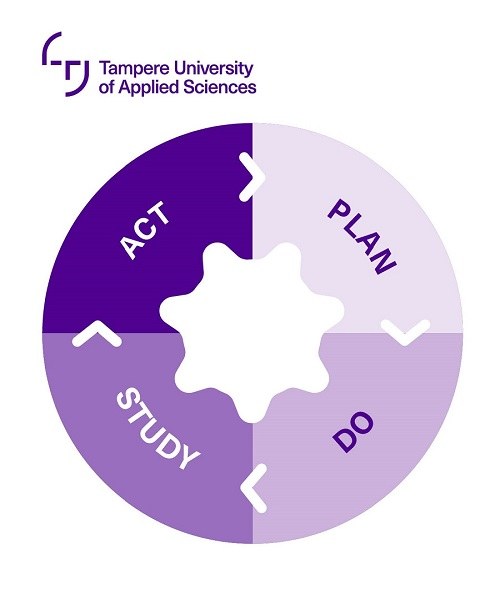
Together with the management and business planning systems, it ensures that the organisation achieves its strategic and expected results. Quality management is an integrated part of the organisation’s operation. All members of the university of applied sciences community participate in it. Quality responsibilities are determined as a part of the quality system.
The quality system description and all operational guidelines can be found in internal communications channels used by staff and students. Information for external stakeholders can be found on the website. Quality management is discussed actively on a variety of forums.
(Quality policy was updated in spring 2021.)
Quality work principles
At TAMK, quality work and development are a part of everybody’s work. They are based on open doing together. The quality work principles were drawn up to support and concretise every TAMK member’s quality development work. Through the principles, different actors also perceive the significance of their activities as an essential part of the whole.
The principles were drawn up by the Working Group on Quality Management, which consists of representatives of TAMK’s schools, units and Tamko as well as student representatives. The principles were approved by the Higher Education Council (update in 2020).
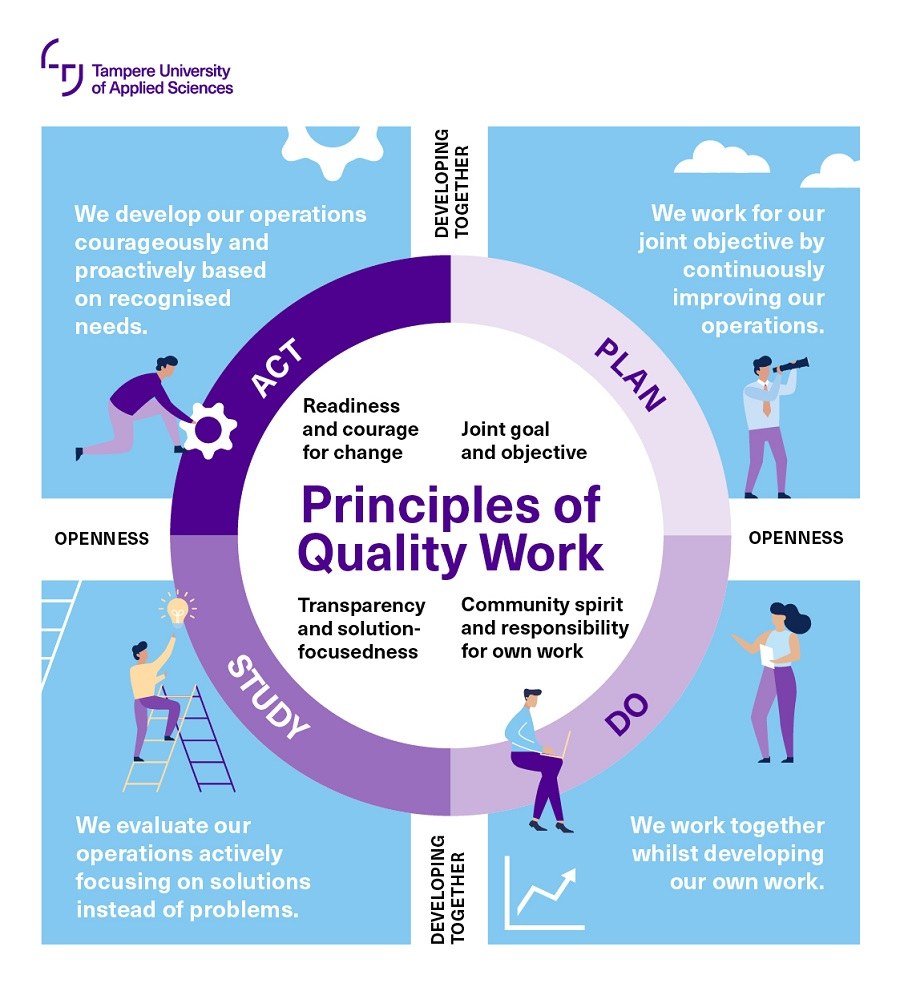
Quality system
The quality system aims at enabling, supporting and ensuring the higher education institution’s impactful operation. The aim is also to establish an operational culture which encourages evaluation of personal work, continuous learning and development as well as distribution of good practices. Quality management also supports TAMK’s development as an expert organisation.
TAMK applies the PDSA cycle (Plan, Do, Study, Act) as its framework for development of operations and quality management. The aim is to improve operations and learn as a continuous process.
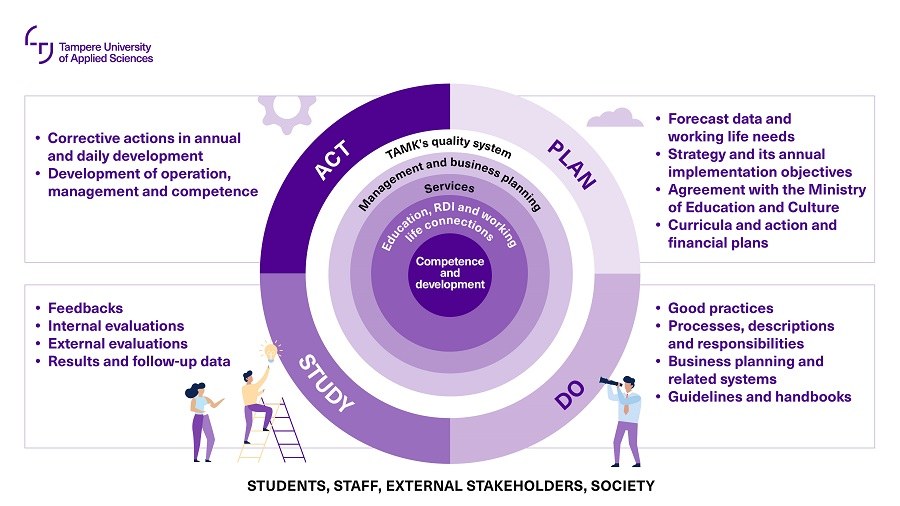
Responsibilities for quality
At TAMK, quality management is a joint matter and all community members participate in it as regards their work, studies and other activities.
The Board of Tampere University of Applied Sciences Ltd decides on key objectives, strategy and steering principles. The Higher Education Council decides on the university of applied sciences’ quality management principles and curricula. The Service Director's duties in TAMK’s executive group include quality management and business planning. The Quality and Information Management coordinates and implements the development work in schools and units as well as reports on functioning of the quality system annually to the Higher Education Council.
TAMK’s Working Group on Quality Management has a key role in integrating TAMK’s quality management practices into TAMK’s operations. The working group is an expert group which evaluates, coordinates, prepares and supports development of the quality system.
Commitments and evaluations
Tampere University of Applied Sciences is committed to national and international principles of quality management and responsible science. The university of applied sciences complies with the higher education community’s open science policy and the Finnish National Board on Research Integrity’s guidelines and is a member of the Ethics Committee of the Tampere region.
TAMK passed a quality system audit by a national audit group in 2022 (valid until 16 February 2028). The audit report has been published on FINEEC’s digital platform (only abstract in English).
TAMK also participates in field-specific evaluations and accreditations.
- Earlier audit reports:
- Accreditation, until 14 June 2024: The Degree Programme in Environmental Engineering (2018, see report).
In addition to external evaluations and audits, self-evaluation is an integrated part of TAMK’s quality system and annual performance agreement process. The quality system data is used extensively in developing and directing TAMK’s operation.
TAMK's quality manual
Quality manual "Quality from TAMK!" presents the key elements of quality system including quality policy, quality management practices and responsibilities.
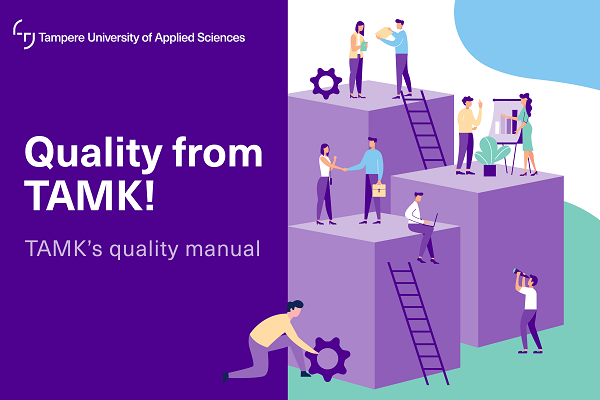
Contact information
- Service Director Piia Tienhaara, piia.tienhaara [at] tuni.fi (Community Services)
